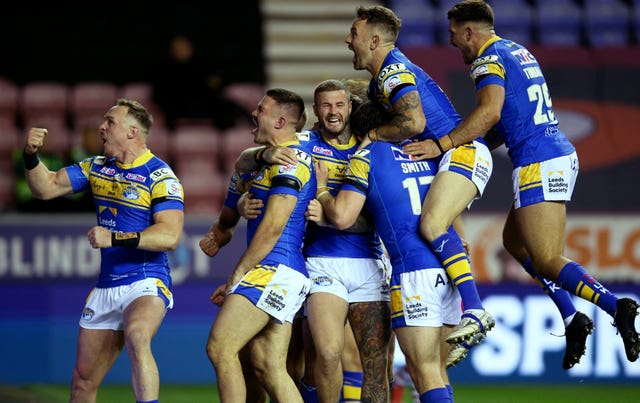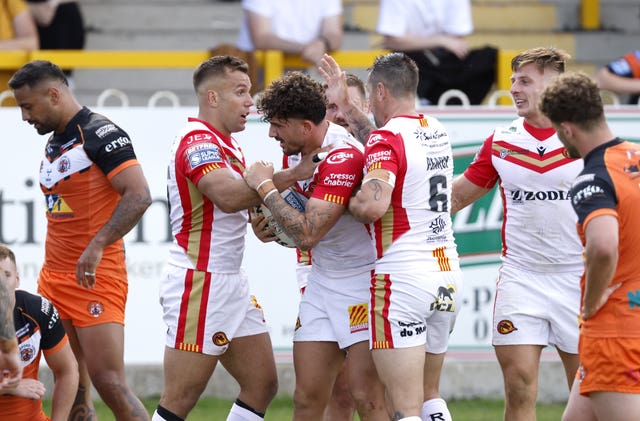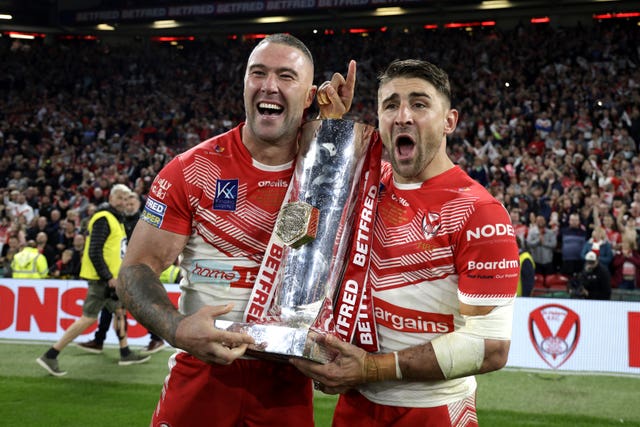
Rugby league is set to scrap automatic promotion and relegation to its top tier and elevate clubs on the basis of a new grading system under proposals unveiled by global sports media giant IMG as part of its 12-year ‘strategic partnership’ with the sport.
Clubs will be categorised in three bands based on a series of as-yet undetermined on and off-field criteria, with teams in the top ‘A’ band guaranteed to earn their place within the competition’s top tier.
Those given category ‘B’ status will fill the remaining places in a 12-team top-flight but face an annual re-assessment in which they must prove themselves worthy of promotion to the safeguarded ‘A’ standard or run the risk of being replaced.
𝗥𝗲𝗶𝗺𝗮𝗴𝗶𝗻𝗶𝗻𝗴 𝗥𝘂𝗴𝗯𝘆 𝗟𝗲𝗮𝗴𝘂𝗲@IMG have presented their recommendations#SuperLeague
— Betfred Super League (@SuperLeague) September 28, 2022
The proposals are set to come into force at the end of the 2024 season, but only if a majority of the 37 professional clubs, who were briefed on the findings by IMG prior to a media presentation in Manchester, vote in favour at a meeting next month.
Matt Dwyer, IMG’s vice president of sports management, said: “We have a unique opportunity to alter the growth trajectory of the sport and we believe the recommendations we have presented today will provide the foundation for that growth and attract new investment into the game.
“Our approach is focused on the product and leveraging the full expertise of IMG and the broader Endeavor network to create a high-quality entertainment offering for the fans.”
 Clubs like Leeds Rhinos could be immune from the threat of relegation (Nigel French/PA)
Clubs like Leeds Rhinos could be immune from the threat of relegation (Nigel French/PA)
Dwyer was anxious to extricate the new plans from the previous licensing model, which was controversially introduced when Super League was launched in 1996, and whose much more rigid criteria effectively excluded a number of clubs from reaching the top-flight.
IMG maintains that because its new criteria will focus on a range of factors, it will still be possible for a club that comes up short in one particular aspect – for example, a lower ground capacity – to achieve ‘A’ licensing if it excels across other areas.
The IMG proposals also include abandoning unpopular ‘loop’ fixtures and the annual ‘Magic Weekend’, ensuring a tighter domestic schedule that will create time for an international break and push the Challenge Cup final back to its more traditional May slot.
 Catalans Dragons are set to keep their top-flight place under new IMG proposals (Richard Sellers/PA)
Catalans Dragons are set to keep their top-flight place under new IMG proposals (Richard Sellers/PA)
Expansion will be lower down the list of priorities, with international entrants capped at two – presumably the two current French clubs, Catalans Dragons and Toulouse – and teams from potential growth areas like London and beyond still being required to fit the criteria via robust long-term business plans.
York chairman Clint Goodchild, whose team stand on the cusp of the current top-flight after reaching this season’s Championship play-offs, broadly welcomed the proposals, and said it was imperative that the sport moved away from what he believes is the myth of jeopardy.
“I think overall it’s a positive scenario for the game in general,” Goodchild told the PA news agency.
“I think we have to be bold in our approach and I think it is probably a good middle ground to give clubs the opportunity to meet a minimum standard that should be required by top-tier professional sport.
“The public may be very fond of (promotion and relegation), but the facts say that it doesn’t work. Everyone likes the idea of potentially going up, but I think it’s the hope that kills.
“Clubs are already stretching beyond their means in areas that are unsustainable. They are spending money on players thinking winning on the field will end in profitability and it has crippled the game.
“What I like about this grading system is that it’s not just about where you are in the table, you have to build a business model and something that will carry its own weight.”
However, the IMG proposals drew short shrift at Keighley Cougars, the club who were denied promotion to Super League in 1996 due to the introduction of the licensing model, and this season won all 20 of their league matches as they were promoted back to the second-tier Championship.
 St Helens will be seeking a fifth consecutive Grand Final triumph next year (Richard Sellers/PA)
St Helens will be seeking a fifth consecutive Grand Final triumph next year (Richard Sellers/PA)
“I value the contribution IMG can bring to sport – they bring weight, talent and value,” said the club’s co-owner Ryan O’Neill.
“However, on what I’ve seen today, I have reservations they fully understand rugby league. This sport is rooted in the north and in the communities. These are the foundations to build on, be proud of, and embraced to organically expand.
“There is a huge opportunity to engage with people, to entertain people, to create a sport that is dynamic.
“This doesn’t mean super clubs that are immortal to the jeopardy of relegation. It means offering a competitive sport where losers can become winners, and winners can become losers. Preserving glamour clubs for vanity is not the answer.”


Why are you making commenting on The Herald only available to subscribers?
It should have been a safe space for informed debate, somewhere for readers to discuss issues around the biggest stories of the day, but all too often the below the line comments on most websites have become bogged down by off-topic discussions and abuse.
heraldscotland.com is tackling this problem by allowing only subscribers to comment.
We are doing this to improve the experience for our loyal readers and we believe it will reduce the ability of trolls and troublemakers, who occasionally find their way onto our site, to abuse our journalists and readers. We also hope it will help the comments section fulfil its promise as a part of Scotland's conversation with itself.
We are lucky at The Herald. We are read by an informed, educated readership who can add their knowledge and insights to our stories.
That is invaluable.
We are making the subscriber-only change to support our valued readers, who tell us they don't want the site cluttered up with irrelevant comments, untruths and abuse.
In the past, the journalist’s job was to collect and distribute information to the audience. Technology means that readers can shape a discussion. We look forward to hearing from you on heraldscotland.com
Comments & Moderation
Readers’ comments: You are personally liable for the content of any comments you upload to this website, so please act responsibly. We do not pre-moderate or monitor readers’ comments appearing on our websites, but we do post-moderate in response to complaints we receive or otherwise when a potential problem comes to our attention. You can make a complaint by using the ‘report this post’ link . We may then apply our discretion under the user terms to amend or delete comments.
Post moderation is undertaken full-time 9am-6pm on weekdays, and on a part-time basis outwith those hours.
Read the rules here